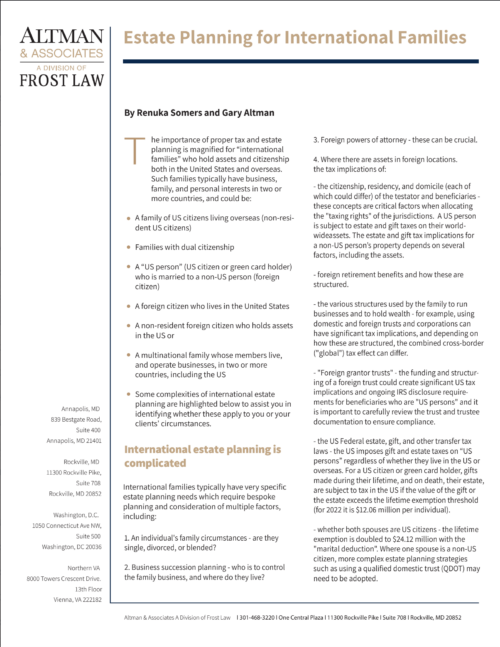The importance of proper tax and estate planning is magnified for “international families” who hold assets and citizenship both in the United States and overseas. Such families typically have business, family, and personal interests in two or more countries, and could be:
- A family of US citizens living overseas (non-resident US citizens)
- Families with dual citizenship
- A “US person” (US citizen or green card holder) who is married to a non-US person (foreign citizen)
- A foreign citizen who lives in the United States
- A non-resident foreign citizen who holds assets in the US or
- A multinational family whose members live, and operate businesses, in two or more countries, including the US
- Some complexities of international estate planning are highlighted below to assist you in identifying whether these apply to you or your clients’ circumstances.
International estate planning is complicated
International families typically have very specific estate planning needs which require bespoke planning and consideration of multiple factors, including:
- An individual's family circumstances - are they single, divorced, or blended?
- Business succession planning - who is to control the family business, and where do they live?
- Foreign powers of attorney - these can be crucial.
- Where there are assets in foreign locations. the tax implications of:
- the citizenship, residency, and domicile (each of which could differ) of the testator and beneficiaries - these concepts are critical factors when allocating the "taxing rights" of the jurisdictions. A US person is subject to estate and gift taxes on their worldwideassets. The estate and gift tax implications for a non-US person’s property depends on several factors, including the assets.
- foreign retirement benefits and how these are structured.
- the various structures used by the family to run businesses and to hold wealth - for example, using domestic and foreign trusts and corporations can have significant tax implications, and depending on how these are structured, the combined cross-border ("global") tax effect can differ.
- "Foreign grantor trusts" - the funding and structuring of a foreign trust could create significant US tax implications and ongoing IRS disclosure requirements for beneficiaries who are "US persons" and it is important to carefully review the trust and trustee documentation to ensure compliance.
- the US Federal estate, gift, and other transfer tax laws - the US imposes gift and estate taxes on “US persons” regardless of whether they live in the US or overseas. For a US citizen or green card holder, gifts made during their lifetime, and on death, their estate, are subject to tax in the US if the value of the gift or the estate exceeds the lifetime exemption threshold (for 2022 it is $12.06 million per individual).
- whether both spouses are US citizens - the lifetime exemption is doubled to $24.12 million with the "marital deduction". Where one spouse is a non-US citizen, more complex estate planning strategies such as using a qualified domestic trust (QDOT) may need to be adopted.
- US State-specific estate and inheritance tax laws - these can differ from state to state and need to be carefully reviewed.
- applicable international tax treaties - the US has bilateral estate and gift tax treaties and income tax treaties with several countries. However, the US does not have estate and gift tax treaties with most countries in Eastern Europe, the Middle East, Africa and Central and South America.
- the specific overseas estate, gift, inheritance, and transfer taxes; and
- the availability of foreign tax credits
- The legal system and inheritance laws applicable in the overseas jurisdiction(s) and on intestacy which may determine the distribution of assets - for example, Hindu laws, Sharia law, and Halacha law and Wills.
- The probate laws and restrictions in each jurisdiction and whether probate can be "bypassed”.
- Whether an "International Will" would be appropriate.
- A US person testator's prior tax compliance and disclosure - if the testator has not filed taxes appropriately, the estate must do so and could be subject to significant interest and penalties.
- The ongoing tax compliance and disclosure requirements for beneficiaries of the estate - US persons who are foreign residents will need to file
- taxes in the US and ensure disclosure of interests in foreign entities and receipts of gifts and distributions from foreign residents and foreign trusts.
Plan ahead Due to the complexities, it is crucial to be proactive and plan.
The attorneys of Altman & Associates, a Division of Frost Law have experience in assisting dual citizenship / residency families with assets in the US and in overseas jurisdictions such as Europe, Australia, India, and Israel, and can assist you or your clients.
By Gary Altman, Esq., Partner & Renuka Somers, Esq., Consultant
